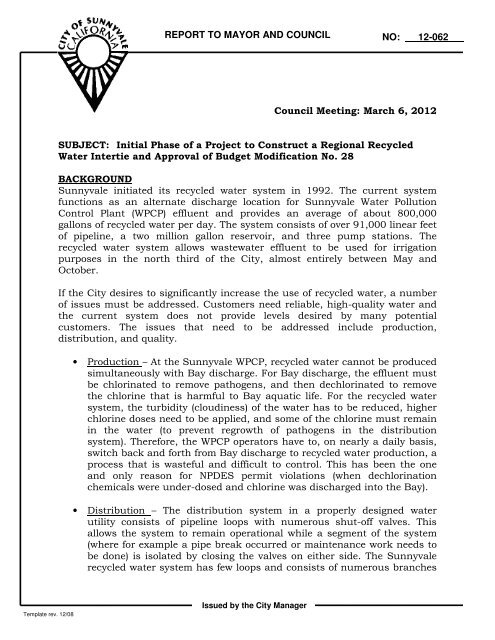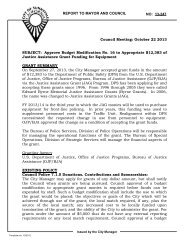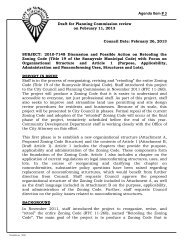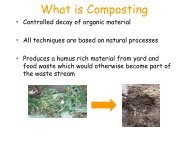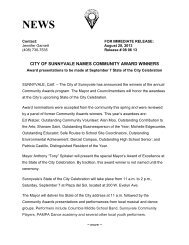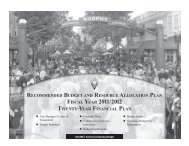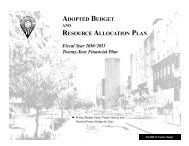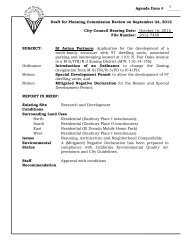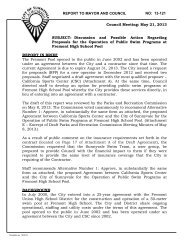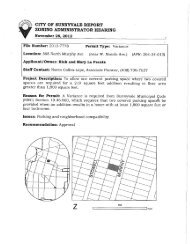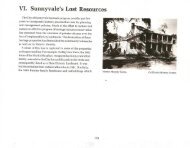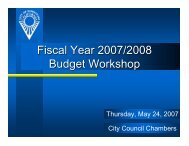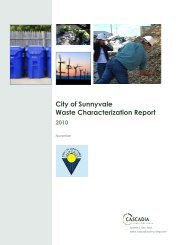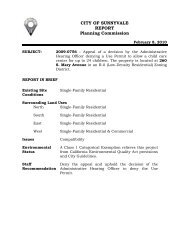REPORT TO MAYOR AND COUNCIL NO: 12 ... - City of Sunnyvale
REPORT TO MAYOR AND COUNCIL NO: 12 ... - City of Sunnyvale
REPORT TO MAYOR AND COUNCIL NO: 12 ... - City of Sunnyvale
Create successful ePaper yourself
Turn your PDF publications into a flip-book with our unique Google optimized e-Paper software.
Template rev. <strong>12</strong>/08<br />
<strong>REPORT</strong> <strong>TO</strong> <strong>MAYOR</strong> <strong>AND</strong> <strong>COUNCIL</strong><br />
Issued by the <strong>City</strong> Manager<br />
<strong>NO</strong>: <strong>12</strong>-062<br />
Council Meeting: March 6, 20<strong>12</strong><br />
SUBJECT: Initial Phase <strong>of</strong> a Project to Construct a Regional Recycled<br />
Water Intertie and Approval <strong>of</strong> Budget Modification No. 28<br />
BACKGROUND<br />
<strong>Sunnyvale</strong> initiated its recycled water system in 1992. The current system<br />
functions as an alternate discharge location for <strong>Sunnyvale</strong> Water Pollution<br />
Control Plant (WPCP) effluent and provides an average <strong>of</strong> about 800,000<br />
gallons <strong>of</strong> recycled water per day. The system consists <strong>of</strong> over 91,000 linear feet<br />
<strong>of</strong> pipeline, a two million gallon reservoir, and three pump stations. The<br />
recycled water system allows wastewater effluent to be used for irrigation<br />
purposes in the north third <strong>of</strong> the <strong>City</strong>, almost entirely between May and<br />
October.<br />
If the <strong>City</strong> desires to significantly increase the use <strong>of</strong> recycled water, a number<br />
<strong>of</strong> issues must be addressed. Customers need reliable, high-quality water and<br />
the current system does not provide levels desired by many potential<br />
customers. The issues that need to be addressed include production,<br />
distribution, and quality.<br />
• Production – At the <strong>Sunnyvale</strong> WPCP, recycled water cannot be produced<br />
simultaneously with Bay discharge. For Bay discharge, the effluent must<br />
be chlorinated to remove pathogens, and then dechlorinated to remove<br />
the chlorine that is harmful to Bay aquatic life. For the recycled water<br />
system, the turbidity (cloudiness) <strong>of</strong> the water has to be reduced, higher<br />
chlorine doses need to be applied, and some <strong>of</strong> the chlorine must remain<br />
in the water (to prevent regrowth <strong>of</strong> pathogens in the distribution<br />
system). Therefore, the WPCP operators have to, on nearly a daily basis,<br />
switch back and forth from Bay discharge to recycled water production, a<br />
process that is wasteful and difficult to control. This has been the one<br />
and only reason for NPDES permit violations (when dechlorination<br />
chemicals were under-dosed and chlorine was discharged into the Bay).<br />
• Distribution – The distribution system in a properly designed water<br />
utility consists <strong>of</strong> pipeline loops with numerous shut-<strong>of</strong>f valves. This<br />
allows the system to remain operational while a segment <strong>of</strong> the system<br />
(where for example a pipe break occurred or maintenance work needs to<br />
be done) is isolated by closing the valves on either side. The <strong>Sunnyvale</strong><br />
recycled water system has few loops and consists <strong>of</strong> numerous branches
Initial Phase <strong>of</strong> a Project to Construct a Regional Recycled Water Intertie and Approval <strong>of</strong> Budget<br />
Modification No. 28<br />
March 6, 20<strong>12</strong><br />
Page 2 <strong>of</strong> 7<br />
serving only irrigation customers. Branches contribute to inconsistent<br />
pressures and water quality issues.<br />
• Quality – The recycled water produced at the <strong>Sunnyvale</strong> WPCP meets the<br />
regulatory requirements for non-potable recycled (purple pipe) water.<br />
However, the salt concentration in the recycled water is high. Typical<br />
potable water has a salt content (TDS or total dissolved solids) <strong>of</strong> 300 to<br />
500 ppm (parts per million). The salt content <strong>of</strong> recycled water produced<br />
at the <strong>Sunnyvale</strong> WPCP ranges from 800 to 850 ppm. While this is<br />
acceptable for most irrigation, it is problematic for salt-intolerant plant<br />
species, and undesirable for most industrial uses since additional<br />
treatment is required. The sources <strong>of</strong> salt are being investigated and are<br />
likely to include infiltration <strong>of</strong> Bay water into the sanitary sewer<br />
collection system, industrial sources in the <strong>City</strong>, and residential water<br />
s<strong>of</strong>tener discharges.<br />
The <strong>Sunnyvale</strong> Solution – All <strong>of</strong> these system deficiencies can be solved and<br />
staff will soon be bringing to Council a recommendation to hire a consultant to<br />
develop a Recycled Water Master Plan. A “<strong>Sunnyvale</strong> Solution” would involve<br />
reconfiguring the WPCP to produce recycled water continuously in parallel to<br />
Bay discharge, the construction <strong>of</strong> new recycled water pipes to form loops, and<br />
most likely lining the sanitary sewers near the Bay to reduce the salinity from<br />
salt water infiltration.<br />
The Regional Solution – The difficulty with the <strong>Sunnyvale</strong> Solution is that it will<br />
be difficult to build the recycled water customer base, and especially difficult to<br />
add the more desirable “year-round” industrial customers, given unreliable,<br />
low-quality water. Therefore, <strong>City</strong> staff members have been pursuing an<br />
alternative plan for <strong>City</strong> Council to consider. The action proposed in this memo<br />
would be the first step toward implementation <strong>of</strong> this plan for a Regional<br />
Solution.<br />
EXISTING POLICY<br />
<strong>City</strong> Policy 3.1.1 Water Resources- Goals, Policies and Action Strategies<br />
Policy 3.1.1 (A.2): Maximize recycled water use for all Title 22 approved<br />
purposes both within and areas adjacent to the <strong>City</strong>, where feasible.<br />
Policy 3.1.1 (A.2c): Investigate recycled water interties and agreements to<br />
improve system reliability and to facilitate regional recycled water deliveries.<br />
DISCUSSION<br />
At the heart <strong>of</strong> the Regional Solution is an intertie pipeline (ultimately several<br />
pipelines) that would connect the <strong>Sunnyvale</strong> recycled water system to the<br />
South Bay Water Recycling (SBWR) system. (See Attachment A) SBWR is owned
Initial Phase <strong>of</strong> a Project to Construct a Regional Recycled Water Intertie and Approval <strong>of</strong> Budget<br />
Modification No. 28<br />
March 6, 20<strong>12</strong><br />
Page 3 <strong>of</strong> 7<br />
and operated by San Jose (in a close partnership with the Santa Clara Valley<br />
Water District - SCVWD) and serves San Jose, Milpitas, and Santa Clara. The<br />
SBWR System uses water produced continuously at the San Jose-Santa Clara<br />
WPCP and serves both irrigation and industrial customers. The current salt<br />
content in the SBWR system is about 750 ppm. However, the SCVWD and<br />
SBWR are constructing a $60 million Advanced Water Treatment Facility<br />
(AWTF) that will produce water with a salt content <strong>of</strong> 500 ppm when the AWTF<br />
is operational, currently estimated to be September 20<strong>12</strong>.<br />
By connecting to the SBWR system, <strong>Sunnyvale</strong> could feed its recycled water<br />
distribution system partially or entirely with the reliable, higher-quality SBWR<br />
water. Hydraulic system modeling has been completed as verification. The<br />
intertie would allow <strong>Sunnyvale</strong> to add customers, both irrigation and<br />
industrial, and grow its system and revenue base <strong>of</strong> recycled water. Increased<br />
use <strong>of</strong> recycled water will <strong>of</strong>fset existing potable water use resulting in reduced<br />
revenue to the <strong>City</strong>’s water utility fund. Meanwhile, the redesign and<br />
reconstruction <strong>of</strong> the recycled water production facilities at the <strong>Sunnyvale</strong><br />
WPCP could proceed with less time pressure.<br />
A map showing the route for a northern regional connector intertie pipeline is<br />
included as Attachment B. Approximately 8,000 linear feet <strong>of</strong> pipeline would be<br />
constructed in Santa Clara and an additional 8,000 linear feet will be<br />
constructed in <strong>Sunnyvale</strong>. For <strong>Sunnyvale</strong>’s current needs, a 16-inch pipe is<br />
required at a cost estimated at $6.5 million. However, a larger pipe, up to 30<br />
inches in diameter, costing up to $10 million, would provide for the ultimate<br />
needs along this pipe alignment for <strong>Sunnyvale</strong> and potentially for other cities.<br />
The funding needed to upsize this pipe would be derived from sources other<br />
than <strong>Sunnyvale</strong>. (Other funding sources are discussed below.) The preliminary<br />
design and CEQA work for this alignment is currently being done by other<br />
agencies.<br />
A second pipeline that is under consideration as part <strong>of</strong> a regional solution is a<br />
pipeline along Wolfe Road, from the existing San Lucar Recycled Water Pump<br />
Station (located at the northwest corner <strong>of</strong> Wolfe Road and the Caltrains track)<br />
to Homestead Road, a distance <strong>of</strong> approximately 13,500 linear feet. This<br />
pipeline would serve the southeast quadrant <strong>of</strong> <strong>Sunnyvale</strong> and serve as the<br />
eastern leg <strong>of</strong> a full-<strong>City</strong> loop system. In addition, this pipeline could serve the<br />
Apple Campus 2 in Cupertino, and if upsized, additional customers to the<br />
south. Apple Computer has indicated a strong desire to receive high quality<br />
recycled water and a willingness to assist with project funding. The water<br />
retailer for the Apple Campus 2 in Cupertino is California Water Service<br />
Company (Cal Water). Cal Water has also indicated their willingness to assist<br />
in funding this project. To meet Apple’s timing needs, CEQA documentation<br />
needs to commence immediately followed soon thereafter by preliminary<br />
design. Staff is proposing that the <strong>City</strong> fund the initial work on this alignment
Initial Phase <strong>of</strong> a Project to Construct a Regional Recycled Water Intertie and Approval <strong>of</strong> Budget<br />
Modification No. 28<br />
March 6, 20<strong>12</strong><br />
Page 4 <strong>of</strong> 7<br />
because the pipeline runs through <strong>Sunnyvale</strong>. Staff estimates the cost to<br />
prepare the environmental documents will be approximately $25,000 and the<br />
initial design will be $175,000. The detailed design and construction cost <strong>of</strong><br />
this project is estimated at $3.55 million, more with upsized pipes, and is<br />
proposed to be funded by sources other than <strong>Sunnyvale</strong>.<br />
In order for recycled water from a combined <strong>Sunnyvale</strong>/SBWR recycled water<br />
distribution system to be delivered through the Wolfe Road pipeline, upgrades<br />
at the San Lucar Pump Station are necessary. Fortunately, the San Lucar<br />
Pump Station was originally designed to allow for future pumps to be added to<br />
deliver recycled water to the south. Upgrades, estimated to cost $1.23 million,<br />
will also be funded by sources other than <strong>Sunnyvale</strong>.<br />
The construction <strong>of</strong> both the Northern Intertie and the Wolfe Road<br />
Extension/San Lucar Upgrades are contingent on a series <strong>of</strong> agreements<br />
among funding parties. Ultimately, all <strong>of</strong> these agreements will be brought to<br />
Council for consideration. There are a number <strong>of</strong> options that could be<br />
constructed depending on which funding partners ultimately participate,<br />
including construction <strong>of</strong> only the Northern Intertie, and smaller diameter<br />
pipes to meet shorter term needs.<br />
The Northern Intertie can likely proceed with nothing more than a funding<br />
partnership between <strong>Sunnyvale</strong> and SBWR, and possible grant assistance from<br />
the US Bureau <strong>of</strong> Reclamation (USBR). The potential <strong>of</strong> receiving USBR grant<br />
funding should be known in April 20<strong>12</strong>. The Wolfe Road alignment and San<br />
Lucar Pump Station upgrade would only be accomplished after reaching<br />
agreements with Cal Water and Apple on scope and funding.<br />
FISCAL IMPACT<br />
The fully sized plan would cost over $20 million (including both the Northern<br />
Intertie and the Wolfe Road Extension and upsized pipes). Possible funding<br />
sources beyond <strong>Sunnyvale</strong> include SBWR (San Jose), the SCVWD, the USBR,<br />
Apple Computer, and Cal Water as well as Santa Clara, Cupertino, and the San<br />
Francisco Public Utilities Commission. The cost to <strong>Sunnyvale</strong> will not be known<br />
until further development <strong>of</strong> the plan. However, staff estimates an investment<br />
in the order <strong>of</strong> $2 million would be appropriate, based on the value <strong>of</strong> growing<br />
our recycled water system while also avoiding upgrade costs for the existing<br />
WPCP. Based on this estimate, by investing $2 million, the <strong>City</strong> could be<br />
leveraged into a $20 million project, with all partners participating, which<br />
would serve the <strong>City</strong> and allow major expansion <strong>of</strong> the recycled water system.<br />
With fewer partners, many downsized alternatives are viable.<br />
Due to the fact that there are many permutations <strong>of</strong> pipe alignments/sizes and<br />
funding partners, it is not possible to estimate the full fiscal impact <strong>of</strong> the<br />
completed project at this time. Several agreements need to be negotiated
Initial Phase <strong>of</strong> a Project to Construct a Regional Recycled Water Intertie and Approval <strong>of</strong> Budget<br />
Modification No. 28<br />
March 6, 20<strong>12</strong><br />
Page 5 <strong>of</strong> 7<br />
dealing with cost and revenue sharing and other provisions. Beyond that, the<br />
sagacity <strong>of</strong> undertaking this project hinges on the future value <strong>of</strong> recycled<br />
water, which in turn depends on the cost and availability <strong>of</strong> other water<br />
sources. The intention <strong>of</strong> staff is to bring to Council a detailed business plan<br />
along with the negotiated agreements so that the Council will have the best<br />
opportunity to judge the merits <strong>of</strong> this project within the context <strong>of</strong> the range <strong>of</strong><br />
future possibilities.<br />
The total cost <strong>of</strong> environmental review and preliminary design, including<br />
contingency, for the Wolfe Road pipeline is estimated to be $200,000. This is<br />
money well spent under almost any future scenario, since a recycled water line<br />
along Wolfe Avenue is a natural extension <strong>of</strong> the system. This project will<br />
provide additional water supply, as well as help to meet wastewater discharge<br />
permit goals by eliminating some discharge to the bay, and therefore benefits<br />
both the <strong>City</strong>’s water and wastewater utilities. Therefore, staff recommends<br />
funding from both utilities based on the same allocable share as used in the<br />
1992 debt that was issued to fund the original construction <strong>of</strong> <strong>Sunnyvale</strong>’s<br />
recycled water system (Water 42% and Wastewater 58%). The Environmental<br />
Services Department is currently working to reprioritize its projects in both the<br />
water and wastewater utilities. Due to the complexity and long lead times <strong>of</strong><br />
projects, staff will be able to shift projects in both the short and long term to<br />
mitigate the rate impact <strong>of</strong> this project by either applying project savings, defunding,<br />
or deferring current and/or future projects. The full cost <strong>of</strong> the project<br />
will be incorporated and presented in the FY 20<strong>12</strong>/13 Recommended Budget<br />
and as part <strong>of</strong> the utility rate setting process.<br />
Budget Modification No. 28<br />
Fiscal Year 2011/20<strong>12</strong><br />
Current Increase<br />
(Decrease)<br />
Revised<br />
Water Supply and Distribution Fund<br />
Expenditures:<br />
Project 825391 – Wolfe/Evelyn<br />
Plant Mechanical Reconstruction<br />
$1,147,357 ($84,000) $1,063,357<br />
New Project – Regional Recycled<br />
Water Intertie<br />
Wastewater Management Fund<br />
Expenditures:<br />
Project 825521 – Pond<br />
Sedimentation Removal<br />
$0<br />
$200,000<br />
$200,000<br />
$2,796,929 ($116,000) $2,680,929
Initial Phase <strong>of</strong> a Project to Construct a Regional Recycled Water Intertie and Approval <strong>of</strong> Budget<br />
Modification No. 28<br />
March 6, 20<strong>12</strong><br />
Page 6 <strong>of</strong> 7<br />
PUBLIC CONTACT<br />
Public contact was made by posting the Council agenda on the <strong>City</strong>'s <strong>of</strong>ficialnotice<br />
bulletin board outside <strong>City</strong> Hall, at the <strong>Sunnyvale</strong> Senior<br />
Center, Community Center and Department <strong>of</strong> Public Safety; and by making<br />
the agenda and report available at the <strong>Sunnyvale</strong> Public Library, the Office <strong>of</strong><br />
the <strong>City</strong> Clerk and on the <strong>City</strong>'s Web site.<br />
ALTERNATIVES<br />
1. Pursue a Recycled Water Regional Intertie to connect <strong>Sunnyvale</strong>’s system<br />
to SBWR on the north, and Cal Water service area to the south, and<br />
approve Budget Modification No 28 for $200,000.<br />
2. Reject the Regional Solution and focus on the <strong>Sunnyvale</strong> Solution.<br />
3. Continue to operate as is.<br />
RECOMMENDATION<br />
Staff recommends Alternative No. 1: Pursue a Recycled Water Regional Intertie<br />
to connect <strong>Sunnyvale</strong>’s system to SBWR on the north, and Cal Water service<br />
area to the south, and approve Budget Modification No 28 for $200,000. As<br />
part <strong>of</strong> this action, staff will negotiate and bring back to Council for approval<br />
agreements with San Jose, Cal Water, Apple, and others as needed for the<br />
construction, operation, and maintenance <strong>of</strong> the facilities as described in this<br />
report.<br />
Reviewed by:<br />
John Stufflebean, Director, Environmental Services<br />
Prepared by: Mansour Nasser, Division Manager<br />
Reviewed by:<br />
Kent Steffens, Director, Public Works<br />
Reviewed by:<br />
Grace Leung, Director, Finance<br />
Approved by:<br />
Gary M. Luebbers<br />
<strong>City</strong> Manager
Attachments<br />
Initial Phase <strong>of</strong> a Project to Construct a Regional Recycled Water Intertie and Approval <strong>of</strong> Budget<br />
Modification No. 28<br />
March 6, 20<strong>12</strong><br />
Page 7 <strong>of</strong> 7<br />
A: Overall Regional System<br />
B: Northern Regional Connector
ATTACHMENT A: Overall Regional System
ATTACHMENT B: Northern Regional Connector


